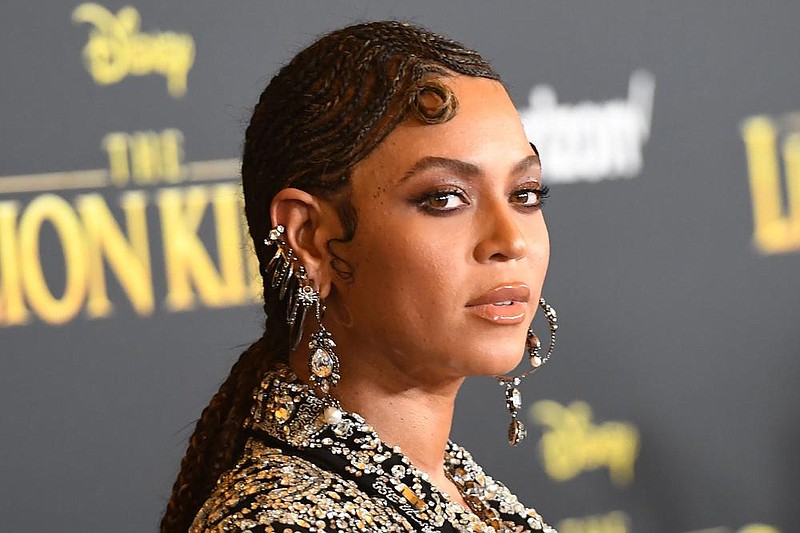Black empowerment is the star of Beyonce’s new visual album, “Black Is King,” a 90-minute reclamation of heritage and power that touched down early Friday morning on the streaming service Disney Plus.
Directed, written and executive produced by the singer, the film is a visual companion to the 2019 album “The Lion King: The Gift,” a recording Queen B curated for “The Lion King” remake. According to Disney, her new effort is meant to reimagine the lessons of “Lion King” “for today’s young kings and queens in search of their own crowns.”
The message — explore and embrace the rich legacy of your ancestors because it’s part of you — may sound simple, but in Beyonce Knowles-Carter’s hands, it’s hardly a rudimentary platitude. With “Black Is King,” she creates a pageant of sight and sound honoring the Black diaspora, weaving a collection of vibrant, profound and defiantly creative scenarios into one abstract and mostly cohesive narrative.
The story revolves around a young African king who is cast out from his family “into an unforgiving world.” To reclaim his throne and self-identity, he must revisit the lessons of the past handed down by his ancestors. And because this journey takes place in Beyonce’s world, it involves powerful commentary about womanhood, touching insights on mothering, a screaming-loud wardrobe and a cheetah-print Rolls-Royce (or is it a Bentley?).
“Black Is King” boasts the choreographed chops of 2018’s “Homecoming” but is structured a lot like 2016’s visual album, “Lemonade.” It’s a collage of highly stylized music videos and dance numbers, strung together by a weighty central idea, peppered with guest appearances and poetry.
The “album” begins in long-ago Africa, a modest woven basket bobbing atop the current of the raging river. Inside is the infant king, a celestial being from the heavens. Beyonce is there on the river bank, replete in a flowing white gown, to receive and coddle the boy.
Is she Mother Earth or Nature? It doesn’t matter. She’s Bey, she’s irresistible, so of course we’ll follow her anywhere. Her star power is undeniable. But just as powerful in “Black Is King” is her intention to intersect her work as an artist with matters outside her own celebrity. Namely, #Black-LivesMatter.
“Bless the body born celestial, beautiful in dark matter,” she says over images of the baby’s first days on Earth. “Black is the color of my true love’s skin. Coils and hair catching centuries of prayer spread through smoke. You are welcome to come home to yourself. Let Black be synonymous with glory.”
Featuring global artists such as Lord Afrixana and Wizkid, as well as familiar collaborators Kendrick Lamar, Pharrell Williams, Childish Gambino and her husband, Jay-Z, her music drives this wild ride from African villages and shanty towns to desolate desert scapes, opulent mansions, lush Edens and dangerous gangster dens. The film is sprinkled with the poetry of Warsan Shire and dialogue from “Lion King,” which sounds downright meditative when it’s not coming out of the mouth of an animated cat.
Beyonce is the star here, no question, but she’s accompanied by a cast that seems to incorporate half the planet. Regular folk are everywhere, as are legions of dancers and recognizable figures such as Lupita Nyong’o, former Destiny’s Child bandmate Kelly Rowland, Naomi Campbell and mother Tina Knowles-Lawson. Beyonce’s children, Blue Ivy and twins Rumi and Sir, are also featured in “Black Is King,” which is dedicated to Sir, her only son.
The production, which was shrouded in secrecy, took a year to film and was shot all over the globe — New York, Los Angeles, South Africa, West Africa, London and Belgium. It was co-directed by Kwasi Fordjour, creative director at Beyonce’s Parkwood Entertainment.
The film arrives at an opportune time in the United States to address long-simmering issues around the Black community and systemic racism, white supremacist rhetoric from Washington and police brutality. “Black Is King” is associated with Disney, however, so it’s less surprising the approach focuses more on affirmation and reclamation of Black pride than on the hard truths making headlines and spurring BLM protests.
Still the intention of this visual album is clear, but if anyone wasn’t sure: “The events of 2020 have made the film’s vision and message even more relevant,” Beyonce posted on Instagram. “I believe that when Black people tell our own stories, we can shift the axis of the world and tell our real history of generational wealth and richness of soul that are not told in our history books.”
Title: “Black Is King” Platform: Disney+ Whent: Now streaming Rating: TV-14
